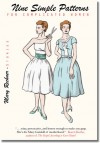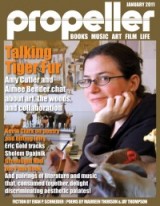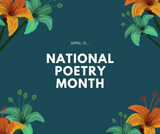 Dan DeWeese’s debut novel, You Don’t Love This Man, is both a mystery and a tender portrait of a flawed but likable man. Over the course of one day, Paul’s bank gets robbed by the same man who robbed it twenty-five years earlier, and he must find his daughter, who’s getting married to his good friend that evening. We fumble along with Paul as he tries to solve these mysteries and as the women in his life—his ex-wife, his daughter and his co-worker—try to show him the way. Lauren Grodstein (A Friend of the Family) calls the novel “alternately joyful and heartbreaking.” Jon Raymond (Livability) says ” . . . DeWeese gives us a portrait of one man’s alienation, self-doubt, passivity, and, ultimately, his redeeming passion.”
Dan DeWeese’s debut novel, You Don’t Love This Man, is both a mystery and a tender portrait of a flawed but likable man. Over the course of one day, Paul’s bank gets robbed by the same man who robbed it twenty-five years earlier, and he must find his daughter, who’s getting married to his good friend that evening. We fumble along with Paul as he tries to solve these mysteries and as the women in his life—his ex-wife, his daughter and his co-worker—try to show him the way. Lauren Grodstein (A Friend of the Family) calls the novel “alternately joyful and heartbreaking.” Jon Raymond (Livability) says ” . . . DeWeese gives us a portrait of one man’s alienation, self-doubt, passivity, and, ultimately, his redeeming passion.”
DeWeese teaches writing at Portland State and is publisher and editor of Propeller Magazine and Propellor Books. His fiction has appeared in Tin House, New England Review and Washington Square, among other publications. He will read with Alan Heathcock at Powell’s Books on Hawthorne on Monday, March 14 at 7:30 pm. We asked him a few questions.
 You Don’t Love This Man is your debut novel. How are you feeling about its release? What’s the best thing that could happen with this book? I was lucky enough to be taken on by a publisher (Harper Perennial) that does a good job of getting their books out into the hands of readers, so the best thing that could happen with my book would simply be that it finds its audience. My sense is that no matter how old we are or what we make or do, most people just hope that someone will say, “I saw that thing you did. I thought it was good.” Books travel mostly by word of mouth, so if people read the novel, like it, and then tell other people about it, I think that’s all I can ask or hope for.
You Don’t Love This Man is your debut novel. How are you feeling about its release? What’s the best thing that could happen with this book? I was lucky enough to be taken on by a publisher (Harper Perennial) that does a good job of getting their books out into the hands of readers, so the best thing that could happen with my book would simply be that it finds its audience. My sense is that no matter how old we are or what we make or do, most people just hope that someone will say, “I saw that thing you did. I thought it was good.” Books travel mostly by word of mouth, so if people read the novel, like it, and then tell other people about it, I think that’s all I can ask or hope for.
 Will you play bookseller and put together a display around it? I like displays that intrigue, so let’s try to craft something that would invite investigation from a browser, which is what I am most times that I’m in a bookstore. One of Amy Bloom’s story collections would be nice. She’s incredibly talented, and her newest collection, Where the God of Love Hangs Out, is great. One of the detective novels the terrific Irish writer John Banville has written under the name Benjamin Black would be fun to put on the table. I thinkChristine Fallsis the first one. The orange type on Philip Roth’s Indignation would give the table some color, and Mary Rechner’s Nine Simple Patterns for Complicated Women would give us an eye-catching cover. (A shopper with a smart phone and a few spare minutes would figure out that the small press I run published Rechner’s book.) One marketing request I have is that we fan some chocolate bars out in the middle of the table, place the books around the chocolate bars, and then
Will you play bookseller and put together a display around it? I like displays that intrigue, so let’s try to craft something that would invite investigation from a browser, which is what I am most times that I’m in a bookstore. One of Amy Bloom’s story collections would be nice. She’s incredibly talented, and her newest collection, Where the God of Love Hangs Out, is great. One of the detective novels the terrific Irish writer John Banville has written under the name Benjamin Black would be fun to put on the table. I thinkChristine Fallsis the first one. The orange type on Philip Roth’s Indignation would give the table some color, and Mary Rechner’s Nine Simple Patterns for Complicated Women would give us an eye-catching cover. (A shopper with a smart phone and a few spare minutes would figure out that the small press I run published Rechner’s book.) One marketing request I have is that we fan some chocolate bars out in the middle of the table, place the books around the chocolate bars, and then put up a sign that says that if you buy any of the books, you get a free chocolate bar. I don’t think we entice readers with chocolate often enough.
put up a sign that says that if you buy any of the books, you get a free chocolate bar. I don’t think we entice readers with chocolate often enough.
I read on your website that when you came to Portland from Colorado, where you grew up, you couldn’t find a teaching or publishing job, so you worked as a banker. So I have to ask, were you ever robbed? No, I was never robbed, thank God. But we did get notifications about other robberies in town, and I still watch news stories of bank robberies with particular interest. When you work in a bank, because you’re taking so many precautions every day centered on preventing robberies, you become sensitized to just how many ways there actually are to rob a bank. So even though I only did that kind of work for a year, it changed the way I viewed banks, and I think the novel spun out from that.
It’s such a smart plot device. I kept waiting for bank robbery storyline to connect with the other storyline, and that added even more intrigue. Did you set out to write such a mysterious novel? That’s a good question. I don’t think I ever said to myself, “Okay, let’s make this mysterious.” But I was definitely interested in writing about a man who claims to have powers, motives and potentials that the reader—and he himself—might question. In other words, I wanted to capture a recognizably complicated human being in a moment—or on a day—of great stress. The book’s epigraph is from the film Forbidden Planet, and Forbidden Planet is a variation on The Tempest, so I was aware from early on that I was working on a type of story that often investigates the role that unseen forces or connections play in our lives.
Maybe it’s because of the Franzenfest that was happening around the time I read the advanced copy of You Don’t Love This Man, but I can’t help comparing the two. Both cover the territory of suburban angst and the life of a marriage—and from the perspective of an older narrator. What do you think of that comparison? I haven’t read Freedom, so, though it’s flattering to be compared to someone of Franzen’s stature, I can’t comment on that book. I will say that there’s something heartening about seeing a single book inspire so much discussion. In an era in which the book business is kind of wringing its hands over whether physical books are still viable products, an event like the release of Freedom makes it clear that a new novel can still be the center of a wide cultural discussion. It shows that there are still a large number of readers alive and well in America, that they have strong opinions and they care deeply about fiction.
 You’re also a publisher and editor of Propeller magazine and Propeller Books. And you’re a teacher and the Writing Center coordinator at Portland State. So it sounds like you’re either writing or editing all the time. What do you do to escape the world of editing and writing? Or do you? My full-time job at Portland State involves teaching, which I love, and the additional work I do as Coordinator of the Writing Center is similar to any manager’s job: I need to create and maintain a safe space within which a talented staff and motivated students can do good work. The beauty of this situation is that I have the opportunity to work, every day, with incredibly smart teachers and students. It’s really the staff of tutors, though, who do the honorable work of sitting down with students, one on one, and offering thoughts on the students’ work and their writing strategies.
You’re also a publisher and editor of Propeller magazine and Propeller Books. And you’re a teacher and the Writing Center coordinator at Portland State. So it sounds like you’re either writing or editing all the time. What do you do to escape the world of editing and writing? Or do you? My full-time job at Portland State involves teaching, which I love, and the additional work I do as Coordinator of the Writing Center is similar to any manager’s job: I need to create and maintain a safe space within which a talented staff and motivated students can do good work. The beauty of this situation is that I have the opportunity to work, every day, with incredibly smart teachers and students. It’s really the staff of tutors, though, who do the honorable work of sitting down with students, one on one, and offering thoughts on the students’ work and their writing strategies.
Propeller, on the other hand, is just a labor of love. When I play the role of editor for another writer, I get to exercise different muscles in my writing brain, and I think this keeps me in some kind of balance. And it’s just so much easier and more fun to cut someone else’s prose rather than your own.
In terms of the escape from words, though: I have two kids who don’t particularly care about my “writing career” or how it’s going, which is great. Any parent will tell you that children are a tremendous source of humility. And if I want to be totally honest, I should admit that I watch my fair share Trail Blazers games, and a lot of NFL games, too.
I love the feature on Propeller where you pair books with music. Will give us a song, CD or multi-song soundtrack for You Don’t Love This Man? The album I listened to more than any other while working on You Don’t Love This Man was The Walkmen’s “You & Me.” I suspect that for the rest of my life, when I put that album on, some part of me will assume we’re sitting down to work on that book again. I’ve liked every album The Walkmen have recorded, but that one holds a special place for me.
 Will you recommend a few books for us? I think Zeno’s Conscience by Italo Svevo is the most inspired story of a man trying to quit smoking that I’ve ever encountered. And Thomas Bernhard’s The Loser is to practicing piano what Svevo’s book is to smoking. I’m speaking very loosely here. Please do not send emails saying I’ve misrepresented those books. Moving on, no one reads Walker Percy’s The Moviegoeranymore. Why is that? I think it’s touching, and it’s an American classic. And there is one writer whose work I like so much that I thought, “I’m going to publish this. I want to start a small press so I can be the person who published this.” That’s Mary Rechner.
Will you recommend a few books for us? I think Zeno’s Conscience by Italo Svevo is the most inspired story of a man trying to quit smoking that I’ve ever encountered. And Thomas Bernhard’s The Loser is to practicing piano what Svevo’s book is to smoking. I’m speaking very loosely here. Please do not send emails saying I’ve misrepresented those books. Moving on, no one reads Walker Percy’s The Moviegoeranymore. Why is that? I think it’s touching, and it’s an American classic. And there is one writer whose work I like so much that I thought, “I’m going to publish this. I want to start a small press so I can be the person who published this.” That’s Mary Rechner. 

